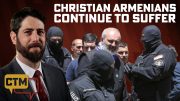Father Frans (Francis) Van der Lugt (shown), a Jesuit priest, was shot and killed in the besieged Syrian city of Homs on April 7. Van der Lugt, who was 75 years old, had done missionary work in Syria since 1966 and had refused to leave the Old City of Homs during more than three years of war.
Pope Francis spoke of the murder of Van der Lugt, calling him his “Jesuit brother,” at the end of his general audience on April 9: “His brutal slaying filled me with profound pain and made me think again about the many people who are suffering and dying in that martyred country, my beloved Syria.”
The Pope added: “No more war! No more destruction!”
Van der Lugt lived in the Bustan al-Diwan district of Homs, which, like the rest of the city, is home to people of many religious faiths. An article in the Daily Star of Lebanon on February 12 cited a statement from the head of the Syrian Red Crescent operations, Khaled Erksoussi, who told AFP that his organization was delivering food to Bustan al-Diwan. Erksoussi said aid trucks had evacuated 20 Christians, who were among 28 mostly Christian families seeking to escape the dangerous area.
A report from the McClatchy newspapers noted that Van der Lugt refused to leave the Homs district earlier in the year when a U.N.-brokered cease-fire allowed about 1,400 starving residents to leave the area. The priest noted his concern for those who refused to evacuate for fear of arrest by government troops outside the city.
“The Syrian people have given me so much, so much kindness, inspiration and everything they have. If the Syrian people are suffering now, I want to share their pain and their difficulties,” Van der Lugt told Agence France-Presse in an interview just before the evacuation.
“The faces of people you see in the street are weak and yellow. Their bodies are weakened and have lost their strength,” he asked. “What should we do, die of hunger?”
Homs has a majority of Sunni Muslims, with minorities of Alawite Muslims, Greek Orthodox Christians, and Syriac Orothodox Christians. The McClatchy report noted,
Occasionally, Christians and their churches have been caught in the middle of an increasingly sectarian civil war that’s pitted Sunni Muslims against Syria’s other minorities, including the dominant Alawite sect, which receives substantial political and economic support from Christian communities.
Syria’s President Bashar Hafez al-Assad is an Alawite.
The nature of the attack made it evident that Van der Lugt had been specifically targeted for assassination.
“A man came into his house, took him outside and shot him twice in the head. In the street in front of his house,” Jan Stuyt, secretary of the Dutch Jesuit Order, told the news agency Agence France-Presse by phone. Stuyt added that the priest would be buried in Syria “according to his wishes.”
Stuyt said Van der Lugt had been living in Syria since the mid-1960s and was on good terms with members of the country’s Muslim majority. “He is like a martyr for the inter-religious dialogue,” he said.
A report in the British Telegraph quoted Abo Moaz, an opposition activist who spoke to the newspaper as he stood “next to the body of Father Francis” at the scene of the crime.
Moaz recounted speaking to an eyewitness of the murder: “The Christian man told me he had been alone with Father Francis and a Christian woman in the monastery when the gunman entered. The woman ran out to ask for help. The masked man took Father to the garden of the monastery and made him sit on a chair. After that he shot him in the head. The bullet hit near his right eye, penetrating his skull.”
The British Guardian quoted a statement made by phone to Vatican Radio by Rev. Ziad Hillal, a priest who was in the monastery when the attacked occurred. Hillal said a single gunman walked into the monastery, entered the garden and shot Van der Lugt in the head. “I am truly shocked. A man of peace has been murdered,” said Hillal.
The Guardian also quoted Albert Abdul-Massih, identified as a man who worked with Van der Lugt, who noted that the priest led an austere life. “He was a Christian clergyman but he was’’t conservative. We learned humanity from him, and he used to love Muslims as much as he loves Christians…. He was treating people [as a trained psychotherapist] for free and he was a fluent Arabic speaker.”
The Rev. Federico Lombardi, a Vatican spokesman, said Van der Lugt, was “a man of peace who with great courage had wanted to remain faithful, in an extremely risky and difficult situation, to the Syrian people to whom he had dedicated for a long time his life and spiritual service.”
The Guardian reported that the gunman’s motives were not known and no one immediately claimed responsibility for the killing. As might be expected, members of the opposing sides in Syria’s civil war are inclined to blame the other. The Telegraph reported that the Syrian state television news agency SANA blamed the killing on “terrorists” but provided no further details. Some members of the rebel opposition blamed the killing on “pro-regime gunmen” whom they asserted had “infiltrated” the rebels’ ranks.
The McClatchy report observed that because Van Der Lugt publicly condemned the Syrian government for its blockade of Homs, some rebel activists accused the Assad regime of assassinating him. However, noted the report, radicals with the Islamic State of Iraq and Syria — a rogue al-Qaeda group — have been repeatedly accused of targeting clergy and churches, and even rebel leaders considered them to be suspects in the priest’s killing.
These reports of radical Islamists targeting Christians is borne out by a March 1 report from Voice of Russia that members of a similarly named group, Islamic State of Iraq and the Levant, were engaged in what basically is a Mafia-style protection racket. The radical group has stated that they would “grant their protection” to Christians only if the latter regularly paid off Islamists and performed fewer Christian church services.
The article quoted a statement from the head of the Russian Orthodox Church, Patriarch Kirill, who said that in 2013 alone, more than 70,000 Christians were killed in Syria.
“The Orthodox Church and the entire world are shocked by the horrors of the civil war in Syria,” said Kirill. “All over Syria, Christians — both archbishops and rank-and-file priests, monks and nuns — are being killed or kidnapped. We cannot remain indifferent to the fate of our brothers and sisters in Christ.”
As we noted in our report about the evacuation of Homs on February 7, attempting to find the villains responsible for the suffering in Homs is a difficult assignment, since both sides have conducted military operations to gain control of the city. And while most major media reports portray the Free Syrian Army as a group of patriots fighting to overthrow an evil regime — a regime that is admittedly difficult to defend — the leading rebel groups are by no means free of radical influences. We cited a January 30, 2012 Washington Post report indicating that Syrian opposition leaders have reported an alarming growth within their ranks of fighters from Jabhar al-Nusra, an extremist group linked to al-Qaeda.
The only thing that is certain is that Father Van der Lugt demonstrated remarkable courage by standing by the people he ministered to in the midst of one of the most devastating and chaotic wars in recent memory.
Photo of Father Frans Van der Lugt: AP Images
Related articles:
Evacuation of Homs Raises Hopes for Syrian Peace Talks
Rebel Atrocities in Syria Escalate, Sparking Alarm Over Obama Plan




